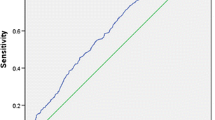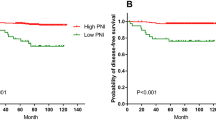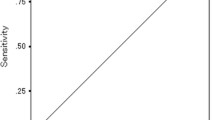Abstract
Purpose
Nutrition and immunity significantly affect the progression of cancer in cancer patients. Therefore, the evaluation of the nutritional and immune status would be useful as a prognostic factor and to determine the optimal treatment strategy for patients with unresectable metastatic colorectal cancer who are receiving chemotherapy. The aim of this retrospective study was to evaluate the prognostic significance of the nutritional and immune status in patients with unresectable metastatic colorectal cancer treated with chemotherapy.
Methods
We retrospectively reviewed 80 patients with colorectal cancer. A total of 22 patients had metachronous unresectable cancer, and 58 patients had synchronous unresectable cancer. All patients underwent combination chemotherapy with oxaliplatin or irinotecan plus 5-fluorouracil/leucovorin as first-line chemotherapy. We then examined the correlations between the Onodera’s prognostic nutritional index (OPNI) and the patients’ clinicopathological features. The OPNI was calculated as follows: 10 × serum albumin (g/dl) + 0.005 × total lymphocyte count (per mm3). According to the receiver operating characteristic (ROC) curve analysis, the cutoff value for OPNI was 44.5.
Results
Patients with a pretreatment OPNI of ≧44.5 demonstrated a longer OS than those with a pretreatment OPNI of <44.5. Moreover, we categorized these patients into four groups according to the combination of the pre- and post-treatment OPNI. The patients in the group with both OPNIs ≥44.5 exhibited a better prognosis compared to the other group (p = 0.001).
Conclusion
The OPNI is considered to be a useful marker for predicting the long-term outcome in patients who receive chemotherapy for unresectable metastatic colorectal cancer.



Similar content being viewed by others
References
Bauer J, Herrmann F (1991) Interleukin-6 in clinical medicine. Ann Hematol 62:203–210
Ceze N, Thibault G, Goujon G, Viguier J, Watier H, Dorval E, Lecomte T (2011) Pre-treatment lymphopenia as a prognostic biomarker in colorectal cancer patients receiving chemotherapy. Cancer Chemother Pharmacol 13:1305–1313
Chojkier M (2005) Inhibition of albumin synthesis in chronic diseases. J Clin Gastroenterol 39:S143–S146
Ciccolallo L, Capocaccia R, Coleman MP et al (2005) Survival differences between European and US patients with colorectal cancer: role of stage at diagnosis and surgery. Gut 54:268–273
Dintinjana RD, Guina T, Krznarić Z, Radić M, Dintinjana M (2008) Effects of nutritional support in patients with colorectal cancer during chemotherapy. Coll Antropol 32:737–740
Dintinjana RD, Trivanovic D, Zelić M et al (2013) Nutritional support in patients with colorectal cancer during chemotherapy: does it work? Hepatogastroenterology 60:475–480
Eisenhauer EA, Therasse P, Bogaerts J, Schwartz LH, Sargent D, Ford R et al (2009) New response evaluation criteria in solid tumours, revised RECIST guideline (version 1.1). Eur J Cancer 45:228–247
Fearon KCH, Falconer JS, Slater C (1998) Albumin synthesis rates are not decreased in hypoalbuminemic cachectic cancer patients with an ongoing acute-phase protein synthesis. Ann Surg 227:249–254
Feng JF, Chen QX (2014) Significance of the prognostic nutritional index in patients with esophageal squamous cell carcinoma. Ther Clin Risk Manag 10:1–7
Forones NM, Mandowsky SV, Lourenco LG (2001) Serum levels of interleukin-2 and tumor necrosis factor-alpha correlate to tumor progression in gastric cancer. Hepatogastroenterology 48:1199–1201
Gupta D, Lis CG (2010) Pretreatment serum albumin as a predictor of cancer survival : a systemic review of the epidemiological literature. Nutr J 9:69
Haggar FA, Boushey RP (2009) Colorectal cancer epidemiology: incidence, mortality, survival, and risk factors. Clin Colon Rectal Surg 22:191–197
Hoffmann TK, Dworacki G, Tsukihiro T, Meidenbauer N, Gooding W, Johnson JT, Whiteside TL (2002) Spontaneous apoptosis of circulating T lymphocytes in patients with head and neck cancer and its clinical importance. Clin Cancer Res 8:2553–2562
Kanda M, Fujii T, Kodera Y, Nagai S, Takeda S, Nakao A (2011) Nutritional predictors of postoperative outcome in pancreatic cancer. Br J Surg 98:268–274
Kayama T, Wakao F, Sobue T, Katanoda K, Tsukuma H, Mikami H, Kitai A (2011) Cancer statistics in Japan, 2011. Foundation for Promotion of Cancer Research, Tokyo
Klek S, Szybinski P, Szczepanek K (2014) Perioperative immunonutrition in surgical cancer patients: a summary of a decade of research. World J Surg 38:803–812
Kuhry E, Schwenk W, Gaupset R, Romild U, Bonjer J (2008) Long-term outcome of laparoscopic surgery for colorectal cancer: a Cochrane systematic review of randomised controlled trials. Cancer Treat Rev 34:498–504
Maeda K, Shibutani M, Otani H et al (2014) Low Nutritional Prognostic Index correlates with poor survival in patients with stage IV colorectal cancer following palliative resection of the primary tumor. World J Surg 38:1217–1222
Mehrkhani F, Nasiri S, Donboli K, Meysamie A, Hedayat A (2009) Prognostic factors in survival of colorectal cancer patients after surgery. Color Dis 11:157–161
Meyerhardt JA, Mayer RJ (2005) Systemic therapy for colorectal cancer. N Engl J Med 3:476–487
Nozoe T, Ninomiya M, Maeda T, Matsukuma A, Nakashima H, Ezaki T (2010) Prognostic nutritional index: a tool to predict the biological aggressiveness of gastric carcinoma. Surg Today 40:440–443
Nozoe T, Kohno M, Iguchi T, Mori E, Maeda T, Matsukuma A, Ezaki T (2012) The prognostic nutritional index can be a prognostic indicator in colorectal carcinoma. Surg Today 42:532–535
Oñate-Ocaña LF, Aiello-Crocifoglio V, Gallardo-Rincón D et al (2007) Serum albumin as a significant prognostic factor for patients with gastric carcinoma. Ann Surg Oncol 14:381–389
Onodera T, Goseki N, Kosaki G (1984) Prognostic nutritional index in gastrointestinal surgery of malnourished cancer patients. Nihon Geka Gakkai Zasshi 85:1001–1005
Rosenberg SA (2001) Progress in human tumour immunology and immunotherapy. Nature 411:380–384
Ross PJ, Ashley S, Norton A et al (2004) Do patients with weight loss have a worse outcome when undergoing chemotherapy for lung cancers? Br J Cancer 90:1905–1911
Rothschild MA, Oratz M, Schreiber SS (1988) Serum albumin. Hepatology 8:385–401
Smyth MJ, Dunn GP, Schreiber RD (2006) Cancer immunosurveillance and immunoediting: the roles of immunity in suppressing tumor development and shaping tumor immunogenicity. Adv Immunol 90:1–50
Sobin L, Gospodarowicz M, Wittekind C (2009) TNM classification of malignant tumors, 7th edn. Wiley, International Union Against Cancer, New York, pp 73–77
Zhang S, Gao F, Luo J, Yang J (2010) Prognostic factors in survival of colorectal cancer patients with synchronous liver metastasis. Color Dis 12:754–761
Zlobec I, Bihl MP, Schwarb H, Terracciano L, Lugli A (2010) Clinicopathological and protein characterization of BRAF- and K-RAS-mutated colorectal cancer and implications for prognosis. Int J Cancer 15:367–380
Conflict of interest
We declare that we have no conflict of interest.
Author information
Authors and Affiliations
Corresponding author
Rights and permissions
About this article
Cite this article
Ikeya, T., Shibutani, M., Maeda, K. et al. Maintenance of the nutritional prognostic index predicts survival in patients with unresectable metastatic colorectal cancer. J Cancer Res Clin Oncol 141, 307–313 (2015). https://doi.org/10.1007/s00432-014-1799-8
Received:
Accepted:
Published:
Issue Date:
DOI: https://doi.org/10.1007/s00432-014-1799-8




